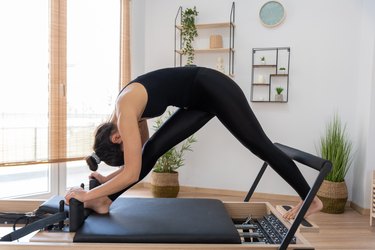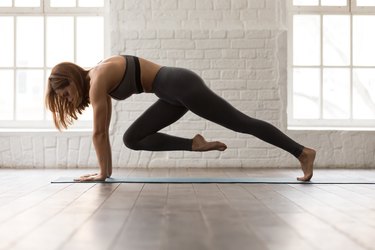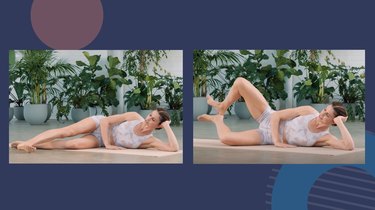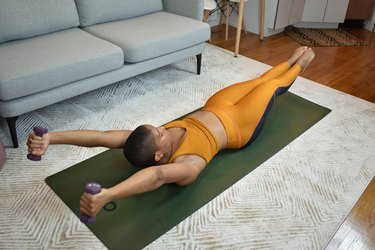
The Pilates reformer may look like another fitness fad, but it's been around since the early 1900s. And with so many benefits, it's a good thing it's not going anywhere.
What's the difference between Pilates and reformer Pilates? When it comes to mats vs. reformers, both Pilates types are focused on moving in a slow and controlled manner to strengthen your muscles and improve posture and alignment.
Video of the Day
Video of the Day
But mat Pilates involves creating resistance with your body weight and sometimes other hand-held props while, you guessed it, planted on the floor. And, on the flip side, the reformer is a tricked-out platform that uses a spring system as resistance, Gia Calhoun, Pilates instructor and vice president of Pilates Anytime, tells LIVESTRONG.com. "The reformer has different compartments, including a carriage that moves and is connected to springs, which attach to the frame," she says.
By exercising on the reformer's moving carriage, or platform, you're not only able to enjoy the base benefits of Pilates — including better back health, flexibility and body awareness, you're able to take them to the next level.
Read on to learn all of the benefits of the Pilates reformer machine.
7 Ways the Pilates Reformer Benefits Your Workouts
1. It Challenges Your Entire Body
Pilates is known for placing a big emphasis on core strength. The reformer keeps that focus, but also makes it easier to strengthen your entire body.
"There are more arms- and legs-specific exercises for the reformer," Calhoun says. For instance, with the machine, you can use the straps to do arm and leg curls, shoulder raises and glute kickbacks.
2. It Lets You Control the Resistance
Because the reformer uses springs as resistance, and you get to attach and detach the springs you want, you also get to select just how "heavy" any given exercise feels.
For example, if you have trouble with squats, you can do them lying on your back on the reformer. By pressing your feet against the end of the reformer, you can do squats without putting as much stress on your knees and without needing to balance.
Or, if you want to up the challenge on your body-weight squat, you can choose the reformer's heaviest springs and put your muscles to the test.
3. It Works Your Muscles Multiple Ways
The Pilates reformer benefits your muscles by working them through each of their three possible actions: concentric, eccentric and isometric, Calhoun says.
Concentric movements are what you probably think of as muscle contractions — they involve your muscle fibers shortening and working with resistance.
Eccentric motions are the opposite, and equate to your muscle fibers lengthening. For example, when you lower from a forward fold to a plank, your abs work eccentrically to control your lowering. Reformers make it easier to work your muscles eccentrically during Pilates exercises.
Last but not least, isometric movements are the hold-it-right-there poses that are all about control. Again, here's a place where reformers really excel.
4. It’s Versatile
The reformer provides endless ways to do strength exercises, thanks to the multiple attachments and props you can add like jump boards, poles and plank bars.
With them, you have the option to do closed-chain movements or open-chain movements — meaning your hand or foot is fixed to an object (the platform of the reformer) or is able to move freely (usually the foot or hand is in a strap). You can do exercises lying down, kneeling or standing up.
This makes it easy to customize your workout according to your fitness level, goals and work with any physical considerations like previous injury.
5. It’s Gentle on Your Joints
Another benefit of the Pilates reformer is that it involves no impact on your joints, Calhoun says. Plus, when you do exercises from a seated or lying position, it's non-weight-bearing — meaning you don't have gravity challenging your joints.
This makes it a great cross-training workout for runners, and also a solid workout method for people with arthritis or other health issues that make high-impact workouts painful or unsafe.
Reformers are also great for rehabbing injuries, Calhoun says. (Though you'll definitely want to work with your doctor and a certified Pilates instructor if you're currently rehabbing an injury.)
6. It Trains Your Full Range of Motion
The bars and cables of the reformer help move your body through a full range of motion — something you might not be able to do on your own. When you hold the cables at your arms or fix the cables to your feet, you can't help but extend to the fullest to follow their track.
"It's easier to cheat on the mat, whereas the reformer you have to move a certain way," Calhoun says.
You might have heard that reformers "lengthen" your muscles or give you "long and lean" muscles. You can't ever make your muscles longer than they actually are, but what you can do is extend your muscle through its full range of motion. This gets the entire muscle working, not just a portion of it, Calhoun says, and also provides a dynamic stretch as you're strengthening.
Working your muscles through a full range of motion is great for maintaining mobility and increasing strength, and is important for everyone but especially important as you age, Calhoun says. "If you don't use it, you lose it."
7. It’s Fun
You might not think this when you're first learning to use it (because it can feel pretty dang hard at first), but the reformer can actually be really fun.
It's a creative way to move your body and, once you're experienced on the reformer, you may be able to do more flashy and acrobatic moves than you can on the mat. The possibilities are endless, and there's always a new challenge you can work toward to keep your workouts fun and interesting.
Related Reading
Is the Pilates Reformer Good for Weight Loss?
Fat loss is a benefit of Pilates reformers, but it's not where it really shines.
For example, in one small November 2015 study in Women Health, researchers followed people assigned female at birth (AFAB) for four months. During that time, the people did two hour-long reformer workouts per week. They lost small amounts of fat from their arms, waist and thighs, and also gained lean muscle.
However, Pilates reformer workouts aren't going to be the most effective method to lose weight. That's because they don't raise your heart rate enough to burn a significant number of calories.
Consider them a great add-on to your weight-loss workout routine, rather than the focus of your program.
How Long Does It Take to See Results From Reformer Pilates?
Like any other exercise method, how long it takes to see results will depend on a lot of different factors, including how often you do the exercise, whether you're recovering properly, genetics and nutrition.
Looking for more of a timeline on your Pilates reformer benefits? Calhoun offers this adage from Joseph Pilates: "In 10 sessions you will feel the difference, 20 days you will see the difference and in 30 days you will have a whole new body."
That doesn't mean that, in 30 days, you'll literally look like or be a different person — maybe one with six-pack abs. What it does mean is that you will feel better — with greater strength, healthier posture, more energy and maybe even less back pain — than before you started.
Those are benefits worth getting excited about.
Was this article helpful?
150 Characters Max
0/150
Thank you for sharing!
Thank you for your feedback!


